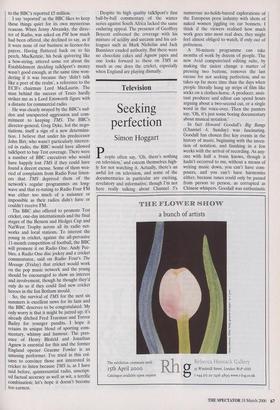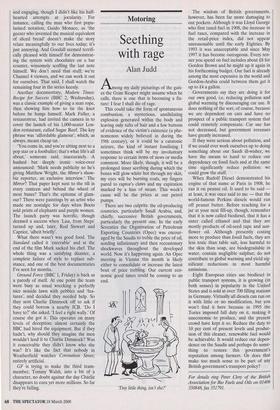Television
Seeking perfection
Simon Hoggart
People often say, 'Oh, there's nothing on television,' and esteem themselves high- ly for not watching it. Actually, there's an awful lot on television, and some of the documentaries in particular are exciting, revelatory and informative, though I'm not here really talking about Channel 5's numerous no-holds-barred explorations of the European porn industry with shots of naked women jiggling on car bonnets. I think if the viewers realised how much work goes into most real docs, they might feel almost obliged to watch, if only out of politeness.
A 50-minute programme can take months of work by dozens of people. The new Avid computerised editing suite, by making the tiniest change a matter of pressing two buttons, removes the last excuse for not seeking perfection, and so takes up far more time than the days when people literally hung up strips of film like socks on a clothes-horse. A producer, assis- tant producer and editor can spend hours arguing about a two-second cut, or a single word in the voice-over. Then the punters say, 'Oh, it's just some boring documentary about musical notation.'
In fact Howard Goodall's Big Bangs (Channel 4, Sunday) was fascinating. Goodall has chosen five key events in the history of music, beginning with the inven- tion of notation, and finishing in a few weeks with the arrival of recording. As any- one with half a brain knows, though it hadn't occurred to me, without a means of writing music down, you can't have com- posers, and you can't have harmonies either, because tunes could only be passed from person to person, as corrupted as Chinese whispers. Goodall was enthusiastic and engaging, though I didn't like his half- hearted attempts at jocularity. For instance, calling the man who first popu- larised notation, Guido Monaco, as 'the geezer who invented the musical equivalent of sliced bread' doesn't make the story relate meaningfully to our lives today; it's just annoying. And Goodall seemed terrifi- cally pleased with himself for demonstrat- ing the system with chocolates on a bar counter, winsomely scoffing the last note himself. We don't need that stuff; we're Channel 4 viewers, and we can work it out for ourselves. That said, I shall watch the remaining four in the series keenly.
Another documentary, Modern Times: Recipe for Success (BBC 2, Wednesday), was a classic example of giving a man rope, then showing him how to tie the knot before he hangs himself. Mark Fuller, a restaurateur, had invited the camera in to cover the launch of his 1,000-seater Lon- don restaurant, called Sugar Reef. The key phrase was 'affordable glamour°, which, as always, meant cheap tat.
`You come in, and you're sitting next to a pop star or a footballer; that's what life's all about,' someone said, inaccurately. A hushed but deeply ironic voice-over announced: 'Mark needs publicity so he's giving Matthew Wright, the Mirror's show- biz reporter, an exclusive interview.' The Mirror? That paper kept next to the till in every canteen and behind the wheel of most buses? That's the epitome of glam- our? There were paintings by an artist who made me nostalgic for days when Boots sold prints of elephants and purple women. The launch party was horrific, though deemed a success when 'Lisa, from Steps' turned up and, later, Rod Stewart and Caprice, 'albeit briefly'.
What there wasn't was good food. The Standard called it 'execrable' and at the end of the film Mark sacked his chef. The whole thing was a satisfying disaster, a complete failure of style to replace sub- stance, and one of the best documentaries I've seen for months.
Ground Force (BBC 1, Friday) is back as a parody of itself. At one point the team were busy as usual wrecking a perfectly nice seaside lawn with pebbles and 'fea- tures', and decided they needed help. So they sent Charlie Dimmock off to ask if they could borrow a nearby JCB. 'Do I have to?' she asked. 'I feel a right wally.' Of course she got it. This operates on many levels of deception: almost certainly the BBC had hired the equipment. But if they hadn't, why should they imagine the men wouldn't lend it to Charlie Dimmock? Was it conceivable they didn't know who she was? It's like the fact that nobody in Weatherfield watches Coronation Street; entirely artificial.
GF is trying to make the third team- member, Tommy Walsh, into a bit of a character, no doubt against the day Charlie disappears to earn yet more millions. So far they're failing.



















































































 Previous page
Previous page